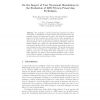Free Online Productivity Tools
i2Speak
i2Symbol
i2OCR
iTex2Img
iWeb2Print
iWeb2Shot
i2Type
iPdf2Split
iPdf2Merge
i2Bopomofo
i2Arabic
i2Style
i2Image
i2PDF
iLatex2Rtf
Sci2ools
108
click to vote
ESORICS
2008
Springer
2008
Springer
On the Impact of User Movement Simulations in the Evaluation of LBS Privacy- Preserving Techniques
The evaluation of privacy-preserving techniques for LBS is often based on simulations of mostly random user movements that only partially capture real deployment scenarios. We claim that benchmarks tailored to specific scenarios are needed, and we report preliminary results on how they may be generated through an agent-based contextaware simulator. We consider privacy preserving algorithms based on spatial cloaking and compare the experimental results obtained on two benchmarks: the first based on mostly random movements, and the second obtained from the context-aware simulator. The specific deployment scenario is the provisioning of a friend-finder-like service on weekend nights in a big city. Our results show that, compared to the contextaware simulator, the random user movement simulator leads to significantly different results for a spatial-cloaking algorithm, under-protecting in some cases, and over-protecting in others.
Contextaware Simulator | Deployment Scenario | ESORICS 2008 | Random User Movement | Security Privacy |
Related Content
| Added | 09 Nov 2010 |
| Updated | 09 Nov 2010 |
| Type | Conference |
| Year | 2008 |
| Where | ESORICS |
| Authors | Sergio Mascetti, Dario Freni, Claudio Bettini, Xiaoyang Sean Wang, Sushil Jajodia |
Comments (0)

